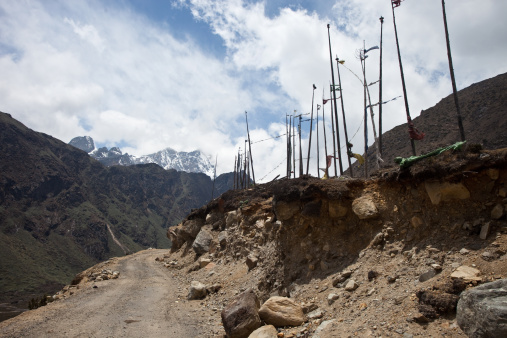
 Energy Crunch
Energy CrunchChina is facing a worsening energy crunch, which is delaying factory output and leading to widespread power cuts across the nation. Chinese officials are stopping at nothing to ensure that there's enough fuel, primarily coal, to fire up power plants to keep factories operational in the upcoming winter months. The problem is partly fueled by demand earlier in 2021 for construction projects that needed fossil fuel and conflict with Beijing's pursuit of ambitious targets to cut carbon emissions.
China, the world's largest coal consumer, is also facing flooding in one of its key coal producing provinces, forcing shuttered coal mines to be reopened, and a release of Australian coal, despite a nearly year-long unofficial import ban on the fuel. Domestic coal prices are facing an all-time high, and throwing into question the UK's ambitions for securing a global agreement on phasing out coal at the COP26 climate summit in Glasgow.
Partly as a result of the crisis, the price of manufactured goods is surging at a record pace, and China's producer-price index rose by 10.7% in September from a year ago, growing at the fastest pace in 25 years, according to the National Bureau of Statistics. The crisis is putting additional strain on global supply chains, which are already struggling with port congestion, soaring freight rates and delays.
 Deepening Tensions
Deepening TensionsThe latest round of top-level military talks between India and China has ended in a bitter stalemate, with New Delhi blaming Beijing for not being "agreeable to its constructive suggestions" as well as failing to provide any "forward-looking proposals," whereas Chinese State Media accused India of "triggering new incidents along the eastern section of the border." Despite reports earlier this year that real progress was being made, troop levels on the China-India border are now at their highest level in decades, and tensions are rising, just as China's increased military activity in the Taiwan Strait threatens to boil over.
Chinese State Media has meanwhile denied Indian claims that 200 Chinese troops who crossed over to the Indian side were detained, saying that a routine patrol had been "unreasonably obstructed" late last month.
Tensions have been further inflamed by a recent visit by the Indian vice president to Arunachal Pradesh, a state in eastern India claimed by China. Beijing raised objections to the visit, saying that New Delhi should "stop taking actions that would complicate and expand the boundary issue." India countered that Arunachal Pradesh is "an integral and inalienable part of India."
Read more in "China-India Relations at Crossroads," by Su Jingxiang, a Fellow at the China Institutes for Contemporary International Relations.
 Available for Hire
Available for HireMicrosoft's LinkedIn announced this week that they're shutting down the localized version of their platform in China, marking the end of the last American social media-network openly functioning in the country. The move follows LinkedIn's suspension of new members joining the platform back in April while the company worked to be in compliance with local law. Earlier this month, several U.S. journalists were also blocked on LinkedIn in China for sharing "prohibited content."
LinkedIn stated that their main reason for the decision is a "significantly more challenging operating environment and greater compliance requirements," according to Mohak Shroff, senior vice president of engineering at LinkedIn. Furthermore, the company noted that their primary success in China has been related to the job-searching aspect of the platform, and helping Chinese members find job opportunities, versus the social-networking part of the platform that has accumulated popularity in other countries. With this, LinkedIn is developing a new jobs application app called "InJobs," that will solely serve as a portal to apply for jobs. It will not include a social feed or options to share articles.
As China's broad-based regulations have taken a toll on big tech and internet companies over the last year, including both local and foreign businesses alike, Chinese employees have their own bone to pick with high-profile companies, such as Alibaba and Baidu. The "996" overtime practice at many Chinese firms, working 9 a.m. to 9 p.m. six days a week, was ruled illegal in August by China's top court. But workers are claiming that the practice is still widespread and began a campaign calling on workers to log their working hours on a viral public website. The "Workers Lives Matter" campaign hopes to be a reference tool for workers when applying for jobs, and also popularize "955" work hours, 9 a.m. to 5 p.m. five days a week.
Prepared by China-US Focus editorial teams in Hong Kong and New York, this weekly newsletter offers you snap shots of latest trends and developments emerging from China every week, while adding a dose of historical perspective.
- 2021-10-08 Stoking Tensions
- 2021-10-01 Great Power Coopetition
- 2021-09-24 Sign of Goodwill?
- 2021-09-17 State of Play
- 2021-09-10 The Last Word
- 2021-09-03 Heightened Frustrations
- 2021-08-27 China’s Backyard
- 2021-08-20 Graveyard of Empires
- 2021-08-13 A New Crossroads
- 2021-08-06 Lowering Barriers
- 2021-07-30 A Diplomatic Stalemate
- 2021-07-23 A Climate for Change
- 2021-07-16 The Trade Game
- 2021-07-09 Existential Threats
- 2021-07-01 Centenary Celebrations
- 2021-06-25 Critical Crossroads
- 2021-06-18 Part of the Club
- 2021-06-11 Retaliatory Legislation
- 2021-06-04 "Defanging" Diplomacy
- 2021-05-28 The End of an Era?